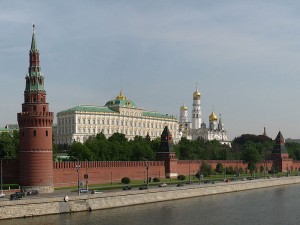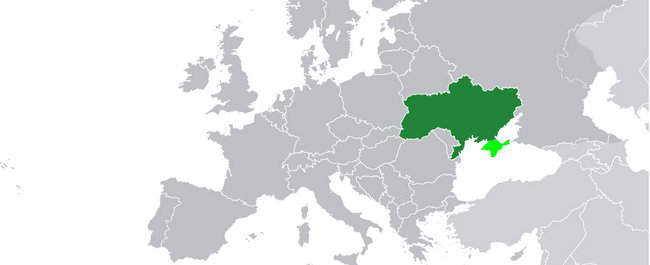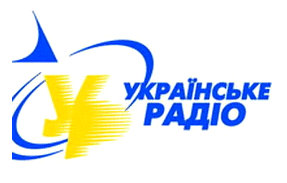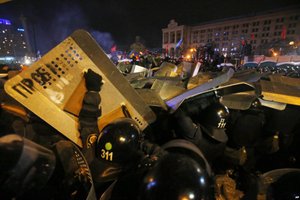
Photo of Kremlin: (Julmin) (retouched by Surendil) via Wikimedia Commons
This morning, I noticed the following press release from the US Broadcasting Board of Governors (BBG):
Russia Clamps Down Further On U.S. International Media
The Broadcasting Board of Governors has condemned a recent decision by Russian authorities to cut off all remaining radio transmissions by U.S. international media in Russia.
In a one-sentence letter dated March 21, Dmitry Kiselev, the director of the information agency Rossiya Segodnya (Russia Today), stated that “we are not going to cooperate” with the BBG’s request to continue a long-standing contract for broadcasting on Russian soil. Effective at the end of March, this decision removes the last vestige of Voice of America programming – including news in Russian and English-language lessons – from a local frequency in Moscow (810 AM).
“Moscow has chosen to do the wrong thing and restrict free speech,” said BBG Chairman Jeff Shell. “This is a fundamental value shared by many countries around the world. The BBG will continue to reach audiences in Russia through digital platforms and via satellite transmissions.”
Distribution of VOA and RFE/RL programming in Russia reached a high point in 2005, when VOA Russian programming was distributed on a nationwide television network and both VOA and RFE/RL had extensive partnerships with domestic Russian radio stations. But starting in that year, the Russian government turned greater attention to these stations and asked them all to re-apply for their licenses. And beginning in 2006, by denying the licenses of the stations that re-applied and intimidating the others, Russian authorities systematically eliminated domestic radio distribution of BBG-supported programs and almost all television distribution. In 2012, Russian authorities forced RFE/RL off its last remaining domestic radio outlet, an AM frequency in Moscow.
“We urge Mr. Kiselev and other Russian authorities to open Russian airwaves to more of our programs and those of other international broadcasters,” Shell added. “We’re asking for an even playing field: As Moscow’s media crackdown deepens, Russian media – including Russia Today television, which is under Mr. Kiselev’s authority – enjoy open access to the airwaves in the United States and around the world. The Russian people deserve the same freedom to access information.”
Kiselev, known for his strident anti-Western and homophobic views on Russian state television, was appointed in December 2013 to lead Russia Today. At the same time the Voice of Russia and the RIA Novosti news agency were merged into Russia Today.
The move also comes amid a fast-moving campaign to target opposition and independent media. Lists of “traitors” have been circulating in Moscow, and pro-Kremlin analyst Sergei Markov recently added RFE/RL’s Russian Service, Radio Liberty to his “list of traitors” on Facebook. In the same vein, politonline.ru, a part of the Pravda.ru media holding, has created Russia’s first top-20 list of the most “anti-Russian” news outlets. This list, which places Radio Liberty sixth, is being shared by influential Russian political advisors such as Alexander Dugin, who wrote on his Facebook page that “this is the order in which Russia’s most contemptible media outlets will be closed or blocked.”
Russians are increasingly turning to the Internet and social media for their news. VOA’s digital strategy incorporates content across platforms. In addition to live interactives with domestic television channels, such as Russian Business Channel, VOA’s web-TV show, Podelis, allows users to connect and engage with the content in real time using social media. Podelis, which means “share” in Russian, provides a unique opportunity to engage in discussions about current events, Russian politics and U.S.-Russia relations. VOA’s social media following in Russia has grown significantly and visits to VOA’s website have doubled every year since 2008.
Radio Free Europe/Radio Liberty’s Russian Service provides 24 hours of radio programming via the Internet and satellite, a website that was visited more than 6.5 million times in March, and a strong presence on social media such as Facebook and Twitter. RFE/RL has started a multi-hour, daily video stream for Russia consisting of coverage of the most important events with reactions from Russian citizens as well as opinions from the West. The stream also includes live roundtable ?discussions and expert interviews on Russia.
On Wednesday, BBG Watch posted an article with details about new legislation that would increase funding for Russian, Ukrainian and Tartar language services to “counter the propaganda that is supported by Russia.”
Here’s a quote from a press release in their article:
“S. 2183 is international broadcasting legislation originally authored by Chairman [Ed] Royce (and included as Section 103 of the Ukraine Support Act (H.R. 4278) that the House passed last week). The legislation authorizes increased funding for Radio Free Europe/Radio Liberty and the Voice of America to enable them to expand their broadcasting in Russian, Ukrainian, and Tatar. This legislation requires the Broadcasting Board of Governors (BBG) to counter the propaganda that is supported by Russia and increase the number of reporters in eastern Ukraine. In addition, this legislation recognizes the threat to free media that neighboring states are under and bolsters the Balkan and Moldovan language services.”
Is it me, or is this starting to feel like the Cold War again?
I think the BBG would be wise to take a close look at the VOA Radiogram. In this case, the target audience is highly computer literate and could easily decode VOA transmissions with a simple shortwave radio and free, open-source software.
 Many thanks to SWLing Post reader, David Iurescia (LW4DAF), who shares this article via Sputnik News:
Many thanks to SWLing Post reader, David Iurescia (LW4DAF), who shares this article via Sputnik News:


